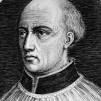
Thomas Beckett
Thomas Becket , also known as St. Thomas of Canterbury, Thomas of London, and then Thomas Becket (December 21, 1119 ((1120?)) - December 29, 1170), was Archbishop of Canterbury from 1162 years before his assassination in 1170. He is revered as a saint and martyr by both the Catholic Church and the Anglican community. He came into conflict with Henry II, king of England, over the rights and privileges of the Church and was assassinated by followers of the king in Canterbury Cathedral. Soon after his death, he was canonized by Pope Alexander III. Beckett's main sources of life are a series of biographies written by contemporaries. Some of these documents belong to unknown authors, although traditional historiography gave them names. Notable biographers include John Salisbury, Edward Grim, Benedict Peterborough, William of Canterbury, William Fitz Stephen, Gern of Pont-St. Maxans, Robert Cricklade, Alan Tewkesbury, Benet of St. Albans and Herbert of Bosch. Other biographers who remain anonymous usually receive the pseudonyms Anonymous I, Anonymous II (or Anonymous Lambeth) and Anonymous III (or Lansdown Anonymous). Apart from these accounts, there are also two others, which are probably modern, that appear in Quadrilogus II and in the saga Thómas erkibyskups. In addition to these biographies, there are also mentions of Beckett's life events in the chroniclers of that time. These include the works of Robert Torigny, “Roger” by Gesta Regis Heinrich Secundi and the Chronicle, the works of Ralph Dicheto, the “History of Rerum” by William Newberg and the works of Gervaz of Canterbury.
